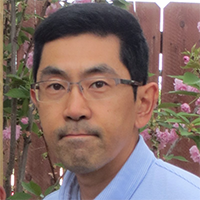Ryohei Urata
Google LLC, USAFor significant contributions to the development and application of optical technologies for data communication networks.

Since his childhood, Ryohei Urata had a love for numbers and mathematics, from doing quick calculations in his head or memorizing obscure sports statistics. This later extended to derivation of physical phenomena (Schrodinger's or Maxwell’s Equation).
Like many engineers, this early interest in mathematics paved the path to his career today. A less common example was a "Writing for Publication" course he took in high school, essentially writing for the school newspaper. With strict but nurturing mentorship from this teacher, Ryohei and hundreds of other students gained an appreciation for the art of wordsmithing. He shares, "Many of today's discoveries or breakthroughs are done through groups and collaborations. In such an environment, you need to be able to communicate, to articulate your ideas [as a scientist/engineer]… I take pride in my writing even as an engineer, and [that class] is definitely where it comes from."
Today, Ryohei's focus is on developing optical technologies for data communications. Having spent over a decade at Google, he has seen the field's growth both within the company and beyond. He recalls that when first starting at Google, optics for use in datacom was in its infancy, and the notion of the Cloud was not prevalent. Today, the Cloud is one of the most rapidly growing areas in IT, and optics is a "critical enabling technology."
The biggest challenge Ryohei faces today is dealing with scale. "If you make a system big enough, something will always be breaking in it. The challenge is to scale by improving reliability and/or availability, through a combination of novel hardware, software, and system design.” Looking to the future, Ryohei sees optics playing an even more significant role for data centers, the Cloud, and machine learning.
Even though Ryohei doesn't work regularly with students, he still has some helpful advice: "Don't be afraid, always challenge yourself to try something outside of your comfort zone. Start at the boundaries of your knowledge and keep pushing those edges.” He also advises young scientists to attend conferences or presentations adjacent to their primary field. He says, "Those interactions at the boundaries can be eye-opening and stimulating. At a minimum, you meet some new, interesting people."
Ryohei also believes in the importance of mentorship. Mentors have been critical for guiding Ryohei throughout his career. First, his parents planted the seed that taking on challenges is an integral part of life. His PhD advisor, David Miller from Stanford University, taught him the importance of analysis based on fundamentals and adaptive articulation of your work: "You should be able to present on your work for 1 minute or 1 hour." Later came many managers, friends, and colleagues who shaped Ryohei's career and life. He shares that at Google, there is a culture of mentorship that has been a great source of support. Sometimes, the only missing piece is an opportunity or ally that advocates for you, and mentors can help provide that bridge. They can also offer contacts or unique perspectives that lead to critical breakthroughs. In this way, Ryohei sees mentors as a critical part of his success and sustaining engineering excellence for any organization. “I’d like to take this opportunity to thank all the great mentors I’ve had throughout my life. I feel so fortunate and humbled to have had their support. None of my successes would have been possible without them.”
One final piece that has been integral to his success has been consistent dedication to his work. He explains that engineering uses the concept of "moonshots" and "roof shots." A moonshot is an idea that is extreme, earth-shattering. On the other hand, a roof shot is more practical, incremental. However, if you consistently achieve roof shots through daily effort and consistency, they can add up to a moonshot. "I've had some good ideas throughout my career, but I think your daily routine is most important, just showing up every day and consistently putting in the effort."
Photo Credit: Ryohei Urata
Profile written by Samantha Hornback
